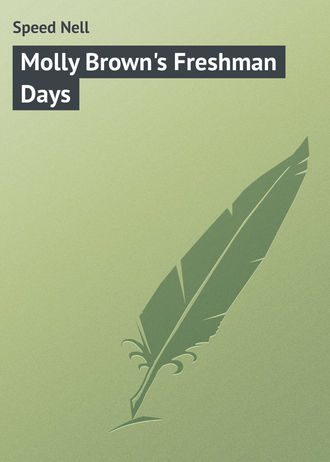 полная версия
полная версияMolly Brown's Freshman Days
The bogus gentlemen were indeed three of the evening’s hostesses and one of the guests. Mary Stewart wore the evening clothes, borrowed from her brother for a senior play to take place shortly. Judy had on the golf suit, Sallie Marks the dinner coat and Margaret the rakish sporting costume.
“But where did you get the cards?” asked Judith, ashamed of herself, now that the visitors’ real identity was disclosed.
“I wrote to Dodo and asked him for them,” answered Judy, giving her a look, as much as to say, “What affair is it of yours?”
After the banquet was commenced and the fun waxed fast and furious, there was a cakewalk at the last, with a box of “cloud-bursts” as the prize, the eight hostesses taking turns as judges.
“After this wild orgy, I think we’d better be leaving,” said Mary Stewart. “It’s getting cold and late, but we’ve had a glorious time. Will you permit a gentleman to kiss you on the cheek, Molly?”
“That I will,” answered Molly, “and proud of the honor.”
Slipping on a skirt and a long ulster, Mary took her departure with Judith and the other girls, who did not have rooms at Queen’s, and pretty soon the party had disbanded.
“I’ll stay and help you gather up the loaves and fishes,” Judy announced. “It’ll soon be ten, but we can hang a dressing gown over the transom and draw the blinds and no one will know the difference just this once,” she added, proceeding to carry out her ideas of deception.
“I’m still hungry,” observed Nance. “I had to wait on so many people I didn’t have a chance to eat any supper myself.”
“So am I famished,” said Molly; “but I was ashamed to confess it.”
“I’d like a cup of hot tea,” observed Judy, who had waited on nobody but herself.
“When Mrs. Markham comes around,” cautioned Nance, “in case she knocks on the door, one of us be ready to put out the light. Judy, you slip into the closet. She’s been known to come in, you know, after one of these jamborees.”
“Mrs. Markham’s away,” answered Judy. “‘Steel beads’ is taking her place until after Thanksgiving.”
The girls munched their sandwiches and talked in low voices. Suddenly there was a sharp rap on the door. Instantly the light went out and there was dead silence. Judy, crawling on all fours toward the closet, was about to conceal herself behind protecting skirts, when the rap was repeated.
“Well, what is it?” called Nance, the boldest among them, “the light is out.”
There was no answer and the rap was not repeated.
The girls waited a few moments, and then cautiously lighting a student’s lamp with a green shade, proceeded with their supper. Judy looked at her watch. It was a quarter of eleven.
Again they were interrupted. This time by some pebbles thrown against the window.
Molly raised the sash softly and gazed down into the darkness below.
“What is it?” she called.
“It’s Margaret,” answered a voice from the yard. “For the love of heaven, can’t you let me in? I’ll explain afterward. I wouldn’t mind ringing up Mrs. Markham, but I’m afraid of that Steel woman.”
“Wait a minute,” answered Molly, and closing the window, she turned to consult with the others.
“There’s nothing to be done but to go down,” they decided, and Molly insisted on being the sacrificial lamb. Judy made her slip on her nightgown over her dress, and her dressing gown over that, in order to appear in the proper guise in case anything happened.
But they were doomed to another shock that night.
Just as Molly opened the door she came face to face with Miss Steel standing outside in the hall.
“Oh, I beg your pardon,” said Molly politely, feeling thankful she had put on her nightgown, “I thought I heard a noise outside.”
“You seem to be sitting up very late to-night, Miss Brown,” said Miss Steel, looking at her coldly. “I was told to enforce the ten o’clock rule in Mrs. Markham’s absence, and I must ask you to get to bed at once, unless you wish to be reported.”
“I’m sorry,” said Molly.
The woman seemed unnecessarily stern, she thought, because, after all, this was not a boarding school, but a college. However, she went back, and closed and bolted the door. In her heart she felt a contempt for any one who would creep about and listen at people’s doors. Mrs. Markham would have been incapable of it.
Just then there came another pebble against the window.
Judy crept to the window this time.
“Wait, Margaret,” she called. “Miss Steel is about.”
There was perfect stillness for several long black minutes. The three girls sat in a row on the floor listening with strained ears and to Judy at least the adventure was not without its enjoyment. At last they felt that it might be safe to act. Taking off their shoes they moved noiselessly to the window and looked down. There stood the courageous Margaret in full view on the roof of the piazza. She had actually shinned up one of the pillars, which was not such a difficult feat as it might seem, as the railing around the piazza had placed her within reach of the wooden grillwork and swinging onto that she had drawn herself up to the roof. She had skinned her wrist and stumped one of her stockinged toes, having removed her shoes and hidden them under the house, but she appeared now the very figure of courage and action, waiting for the next move. The three girls stood looking down at her in a state of fearful uncertainty as to what should be done next, and as if this were not exciting enough, three light telegraphic taps were heard on the door.
“That’s not Miss Steel,” whispered Judy.
“Who is it,” she called softly through the keyhole.
“Jessie,” came the answer.
Instantly the door was opened and Jessie crept in.
“Miss Steel is up,” she whispered. “I saw her on the landing below just now. Be careful. I am scared to death because Margaret hasn’t come back.”
For an answer, they led her to the window and pointed to the shadowy figure of her roommate on the piazza roof.
Because Molly had conceived a dislike and distrust for Miss Steel, she made up her mind to outwit her and save her friend. She reflected that if Margaret tried any of the girls on the second floor whose windows opened on the roof, she might get in but she would still have the third flight to make and as the stairs creaked at every step, it would be a difficult matter. Fortunately Miss Steel’s room was on the other side of the hall.
“I have a scheme,” she whispered at last. “Now, don’t any one move. I can manage it without making a sound.”
There was a ball of twine on the mantelpiece. Thank heavens for that. She tied one end to the back of a cane chair, which she let slowly out of the window. Then, snipping off the end of the cord, she gave it to Nance to hold. Another chair, which was fortunately smaller, she let down in the same way and finally a stool. Margaret placed one on top of the other, mounted the precarious and toppling pyramid, and with the strength of arm and wrist which showed her gymnasium training, pulled herself to the window sill and was in the room.
“Be quiet,” they whispered. “Miss Steel is about.”
The four girls lay down on the couches and waited a long time. Judy really fell asleep in the interval before they dared risk pulling back the chairs. It was, in fact, a risky business, and had to be done cautiously and carefully to keep them from bumping against the walls of the house. At last, however, the whole thing was accomplished.
Margaret explained that she had gone over to one of the other houses to return the clothes she had borrowed and had joined another Thanksgiving party and stayed longer than she had intended. They also had been held up by the matron, and had been obliged to put out the lights and hide everything under the bed. She had escaped from the house by a miracle without being found out, and had trusted to luck and her friends for getting into Queen’s unobserved.
And now, at last, the adventure was almost over. After another interminable wait, Judy and Margaret and Jessie crept off to their rooms.
Judy’s door was still ajar when she saw a flash of light on the stairs, which heralded the approach of Miss Steel, still fully clothed, and walking noiselessly as usual. Judy closed her door and locked it softly.
“Only a spy would wear felt slippers,” she said to herself scornfully. Then she laughed. “It was rather good fun to be sure, but would it have mattered so much, after all, if Margaret had boldly come in at the front door and explained?”
They would never have gone to all that trouble to deceive nice Mrs. Markham, her thoughts continued as she removed her manly attire, but Miss Steel was different.
As for Molly, her thoughts were about the same as Judy’s.
“A lady doesn’t creep,” she was thinking, as she thankfully crawled into bed; “a lady doesn’t listen at doors or wear soundless slippers in order to walk like a cat. No, Miss Steel is decidedly not a lady.”
And when Molly came to this decision about a person, she avoided them carefully ever afterward. Her definition of a “lady” was about the same as a man’s definition of a “gentleman.” It had nothing whatever to do with birth or education.
CHAPTER XVIII
THE FOOTBALL GAME
During those fast flying weeks which tread on one another’s heels so rapidly between Thanksgiving and Christmas, came one of the most important events of the season.
It was announced on the bulletin board as the “Harboard-Snail Football Game,” and was, in fact, a grand burlesque on a game played not long before between two university teams.
Quite half of the Wellington students took part in the affair and those who were not actively engaged were placed in the cheer sections to yell themselves hoarse. There were a dozen doctors, an ambulance, stretcher bearers, trained nurses and the two teams in proper football attire.
Everybody in college turned out one Saturday afternoon to witness this elaborate parody. A coach drove over from Exmoor fairly alive with students, and the fields outside the Wellington athletic grounds were black with people.
Judy was a member of the corps of physicians who were all dressed alike in frock coats reaching well below the knees, gray trousers and silk hats. They had imposing mustaches, carried bags of instruments and were the most ludicrous of all the actors that day.
But it was the stretcher bearers who seemed to excite the greatest merriment in the grand parade which took place before the game began. They were dressed something like “Slivers,” the famous clown, in full white pantaloons and long white coats cut in at the waist with wide skirts. The members of the cheering sections which headed the grand column were dressed in every sort of absurd burlesque of a college boy’s clothes that could be devised.
“How they ever collected all those ridiculous costumes is a marvel to me,” exclaimed President Walker to Dr. McLean, whose face had turned an apoplectic purple from laughter and who occasionally let out a roar of joy that could be heard all the way across the field.
Following the cheering sections in the parade were the two teams, hardly recognizable at all as human beings. Their wigs of tousled hair stood out all over their heads like the petals of enormous chrysanthemums. Most of them wore nose guards or their faces were made up in a savage and barbaric fashion. In their wadded football suits, stuffed out of all human recognition, they resembled trussed fowls. In the vanguard of this strange and ludicrous procession stalked a gigantic figure of Liberty. She was about fifteen feet high, and her draperies reached to the ground. Her long red hair blew in the breezes and she carried a Wellington banner, which she majestically waved over the heads of the multitude. By her side ran a dwarf. They were the mascots of the two sides.
“Why, if that isn’t our little friend, Miss Molly Brown,” exclaimed Dr. McLean, pointing to Liberty. “She’s a bonnie lass and a sweet one. Think now, of her being able to walk on those sticks without losing her balance. It’s a verra great achievement, I’m thinking, for a giddy-headed young woman. For they’re all giddy-headed at seventeen or thereabouts.”
It was indeed Molly, the only girl in all Wellington who could walk on stilts. The seniors had advertised in The Commune for a first-class “stiltswoman,” and Molly had promptly offered her services. Jessie had been selected as the dwarf.
“I hope the child won’t fall and break her neck,” said Mrs. McLean on the other side of the doctor. “It’s verra dangerous. Suppose she should become suddenly faint – ”
“Don’t suppose anything of the sort, mither. You’ve no grounds for thinkin’ the lass will tumble. She seems to be at home in the air.”
Professor Green, just beyond Mrs. McLean, frowned, and put his hands in his pockets. He wondered if Dr. McLean had forgotten that he had been sent for just three weeks before when Molly had fainted in the gymnasium, and the Professor breathed a sigh of relief when Liberty presently descended to the earth and the game began.
It was one of the bloodiest and roughest games in the history of football. The ambulance bell rang constantly. Every time a victim fell, the cheering section on the other side set up a wild yell. Doctors and nurses were scattered all about the edges of the field attending to the wounded and the stretchers were busy every minute. As fast as one man tumbled another jumped into his place, and at last when there came a touchdown the players seemed to have fallen on top of each other in a mad squirming mass.
People laughed that day who were rarely seen to smile. Even Miss Steel’s severe expression relaxed into a cold, steely smile.
Molly had gathered up her long cheesecloth robe and was sitting with Jessie on a bench at the side of the field.
“Isn’t it perfect, Jessie?” she was saying. “I don’t think I ever enjoyed anything so much in all my life. It will make a wonderful letter home.”
Jessie smiled absently. With a pair of field glasses, she was searching the faces of the spectators for two friends (men, of course), who had motored over to see the sport. At her belt was pinned the most enormous bunch of violets ever seen. In fact, they were two bunches worn as one, from her two admirers. Presently Judith joined them on the bench. Ever since the Thanksgiving spread she had endeavored to be very nice to Molly.
“Hello, Ju-ju!” called Jessie; “you are a sight.”
“I know it,” she said. “I feel that I am a disgrace to the sex. I only hope I’m not recognizable.”
“Your shiny black eye is the only familiar thing about you. The rest is entirely disguised.”
“I think I’d recognize that ring, Miss Blount,” put in Molly. “Almost everybody knows that emerald by sight now, who knows you at all.”
Judith glanced quickly at her finger.
“Do you know,” she exclaimed, “I forgot I was wearing it? How stupid of me! I am booked to take Rosamond’s place in a minute. Will one of you girls take care of it for me? I shall be much obliged.”
“You’d better take it, Jessie,” said Molly, looking rather doubtfully at the ring. She had only one piece of jewelry to her name, a string of sapphires, which had belonged to her mother when she was a girl.
But the ring was too big for Jessie’s slender, pretty little fingers.
“I can’t,” she said, “unless I wear it on my thumb, and it might slip off, you know. You’ll have to take it, Molly.”
Molly slipped it on her finger and held it up for admiration.
“It’s the most beautiful ring I ever saw,” she exclaimed. “It’s the color of deep green sea water. Not that I ever saw any, but I’ve heard tell of it,” she added, laughing.
“You don’t mean to say you have never seen the ocean!” cried Judith in a pleasant tone of voice.
Molly had never seen her so amiable before.
“No,” replied the freshman, “this is the nearest I have ever been to it.”
“Well, thanks for taking care of my ring,” went on Judith. “I’ll see you after the game,” and she departed to take up her duties on the field, just as Rosamond, at the appointed time, with a gash across her face, made with finger-nail salve, was borne from the field on a stretcher.
After the game came another grand procession in which all the wounded took part, Molly on stilts, with Jessie running beside her, as before.
All that morning Molly had felt buoyed up by the fun and excitement of the great burlesque. But, now that the game was over, as she strode along on the giant stilts, she began to feel the same overpowering fatigue she had experienced that night at the living picture show. For a week she had been living on her nerves. Often at night she had not slept, but had tossed about on her bed trying to recall her lessons or make mental notes of things she intended to do. On cold mornings, her feet and hands were numb and dead and Judy often made her run across the campus and back to start her circulation. And now that numbness began to climb from her toes straight up her body. Molly turned unsteadily and with shaky strides at least six feet long, hastened across the field. Her feeling that she must get out of the noise and turmoil, away from everybody in the world, carried her back of a row of sheds under which the players sat during the intermissions. Once in this quiet place she let herself down from the stilts. She was conscious of being very cold. There was a deep red light in the western sky from the setting sun, then the numbness reached her brain and she remembered nothing more until she opened her eyes and saw Dr. McLean at one side of her and Professor Green at the other.
“Here she comes back at last,” exclaimed the doctor. “Aye, lass, it’s a good thing this young man has an observant eye. Otherwise ye might have been lying out here in the cold all night. You feel better now, don’t you?”
“Yes, doctor,” answered Molly weakly.
“I don’t like these fainting spells, my lass. You’re not made of iron, child. You’ll have to give up one thing or t’other – study or play.”
But there were other things Molly did beside studying and playing. Of course the doctor did not know about the “cloud-bursts” and the shoe-blacking and the tutoring.
“Aye, here comes one of my associates with a carriage,” he went on, chuckling to himself. “Shall we have a consultation now, Dr. Kean?”
Judy, still in her absurd burlesque costume, had driven up in one of the village surreys.
As the two men lifted Molly into the back seat, she noticed for the first time that she was wearing a man’s overcoat. It was dark blue and felt warm and comfortable. She slipped her hands into the deep pockets and snuggled down into its folds. Certainly she felt shivery about the spine, and her hands and feet, which were never known to be warm, were now like lumps of ice. As the doctor was still wearing his great coat of Scotch tweed, it was evidently the coat of the Professor of English Literature she had appropriated.
“It’s awfully good of you to lend me your coat,” she said to Professor Green, who was standing at the side of the carriage while the doctor climbed in beside her. “I’m afraid you’ll take cold without it.”
“Nonsense,” he said, almost gruffly, “I’m not dressed in cheesecloth.”
“But I have on a white sweater under all this,” said Molly timidly.
The carriage drove away, however, without his saying another word, and later that afternoon, after Molly had taken a nap and felt rested and refreshed, she engaged one of the maids at Queen’s cottage to return Professor Green’s overcoat with a message of thanks. Then, with a sigh of relief, because when she had borrowed anything it always weighed heavily on her mind, and because she felt somehow that the Professor was provoked with her, she turned over and went to sleep again.
Just as the clock in the chapel tower sounded midnight she sat up in bed.
“What is it, Molly, dear?” asked Nance, who was wakeful and uneasy about her friend.
Molly was looking at her right hand wildly.
“The ring!” she cried. “Judith’s emerald ring – it’s gone!”
The ring was indeed gone. Neither of her friends had seen it on her finger since she had been in her room.
It was gone – lost!
“It must have slipped off my finger when I fainted,” sobbed the poor girl.
Nance had summoned Judy at this trying crisis, and the two girls endeavored to comfort their friend, who seemed to be working herself into a state of feverish excitement.
“Never mind, we’ll find it in the morning, Molly,” cried Nance. “You know exactly where it was you fell, don’t you? Somewhere behind the sheds. It’s sure to be there. Judy and I promise to go there first thing, don’t we, Judy?”
“Yes, indeed,” acquiesced Judy, who loved her morning sleep better than anything in life. But Judy was learning unselfishness since she had been associating with Molly and Nance.
There was no more sleep for poor Molly that night, however, and she lay through the dragging hours with strained nerves and throbbing temples wondering what would happen if she did not find the ring.
CHAPTER XIX
THREE FRIENDS
Nance was still sound asleep when Molly crept from her bed and dressed herself. It was a dismal cold morning. A fine snow was falling and she shivered as she tied a scarf around her head, threw her long gray eiderdown cape over her shoulders and slipped from the room, without waking her friend, who was weary after the excitements of the day before.
Across the wind-swept campus she hastened, anxiety lending swiftness to her steps, and at last reached the Athletic Field. At the far end snuggled several low wooden sheds like a group of animals trying to keep warm by staying close together.
“I must hurry,” Molly thought, “or the snow will be so thick I shall never be able to find the ring,” and summoning all her energy she ran as fast as she could straight to the spot where she remembered to have dropped the day before behind the sheds. Breathless and tingling all over with little prickly chills, she knelt down and began to search in the dead grass, brushing the snow away as she hunted. She had not stopped to find gloves, neither had she wasted any time lacing her boots, but had slipped on some pumps at the side of the bed.
For a long time Molly searched every inch of the ground back of the sheds where she might have been. Then, with an ever-growing feeling of desperation, she hunted in the field itself, across which she had followed the parade. And it was here that Judy and Nance found her so absorbed in her search that she had not even noticed their approach.
“Oh, Molly, Molly! what are we going to do with you?” cried Nance, seizing her by the arm impulsively. “You’ll kill yourself by your imprudence. Why didn’t you wait and let us look?”
Molly opened her mouth to answer, and the words came out in a husky whisper. She had entirely lost her voice from hoarseness, without even knowing that she had caught cold.
“I’ve looked everywhere,” she whispered, “and I haven’t found it. I couldn’t have lost it while I was on the stilts, because I never let go of them for a moment. It must have been when I fainted.”
“Judy, you take her home while I look again,” volunteered Nance.
“Take her to the infirmary, you mean,” answered Judy, and she promptly led Molly by a short cut toward the last house on the far side of the campus, where stood the small college hospital.
Molly obediently allowed herself to be piloted along. Her cheeks were burning; there was a feverish light in her eyes, and she no longer felt cold at all, but hot all over with little chills along her spine.
“I’m afraid I’m a great nuisance, Judy, dear. I hope you’ll forgive me, but I’m really in great trouble,” she said huskily, as Judy confided her to one of the two nurses at the hospital.
“Don’t worry,” was Judy’s parting command. “We’ll find the ring. It can’t possibly be lost utterly. It’s too big and green. I’ll see Judith Blount, too. Some one may have found it and returned it to her by this time. I’ll leave a notice on the bulletin board and stand my little St. Joseph on his head,” she added laughing. “You may be sure I’ll leave nothing undone to find that old ring.”
The first thing Judy did after breakfast that Sunday morning was to pay a visit to Judith Blount. There was a placard on her door announcing to whom it might concern that Judith was busy and did not wish to be disturbed, but Judy knocked boldly and at an impatient “Who is it?” replied: “I wish to see you on important business. Please unlock the door.”









